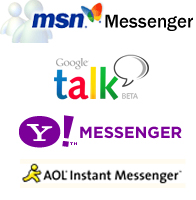Part 2: Attack of the instant messengers


Google Talk
This service is the least used of all four, and for good reason. Google's product, Google Talk, is very plain and limited in features. Partially because of a clean and simple design, Google got the attention of many users when they first launched their search engine. But now it looks like they are going to follow in its predecessors' footsteps and they have a LOT of work to do. Removing everything except the absolutely essential features will not attract new users as effectively as Google's search engine did in the past -- there is no PageRank for IM.
Since Google generates the majority of its income from advertisements, it would not be a surprise if they introduced relevant ads to live chat sessions. As Google already knows, ads are generally welcome as long as they contribute (rather than take away) from the content experience. Users who get extremely annoyed by advertisements should be able to upgrade to a paid version of the software, similar to what Google has done with Google Earth -- unless the market dictates that IM is a freebie.
AIM
AOL has the greatest market share between all four instant messengers. AIM has all the features other IM clients provide and a few that they don't such as file sharing and plug-ins. AOL is continuing to invest in IM with new a new version, code-named Triton. In addition, AOL is in negotiations with Microsoft and Google, who are vying for a piece of AOL to bring hundreds of millions of revenue to their ad-networks. Whoever gets that piece of AOL could have the opportunity to combine with AIM. So imagine this -- Microsoft gets the deal (and it needs the deal to kickstart its new adCenter and block Google) and combines AOL with MSN Messenger, which is going to be integrated with Yahoo IM. Where does that leave Gtalk?
MSN Messenger and Yahoo Messenger
MSN Messenger is a fairly mature piece of software and has about a 25 percent market share, about half as many unique users as AOL. Yahoo! Messenger is slightly less popular than MSN Messenger, but the two share many of the same features and will be interoperable next year. Beginning in the second quarter of 2006, Yahoo Messenger and MSN Messenger users will be able to IM each other, see the presence of their contacts, make PC-to-PC calls, share emoticons and add friends from either service. Unlike MSN, however, there are no advertisements in Yahoo Messenger by default.
Comparison Chart
Here is a chart which shows how each of these services compare.
| Google Talk | Yahoo! Messenger | MSN Messenger | AIM | |
Text Chat | yes | yes | yes | yes |
Voice Chat | yes | yes | yes | yes |
Video Chat | no | yes | yes | yes |
SMS | no | yes | yes | yes |
File Transfer | no | yes | yes | yes |
File Sharing | no | no | no | yes |
Mail Notification | yes | yes | yes | yes |
Contact Groups | no | yes | yes | yes |
Display Images | no | yes | yes | yes |
User Profiles | no | yes | yes | yes |
Message History | yes(short) | yes | yes | manual save |
Search Integration | no | yes | yes | no |
Advertisements | no | no | yes | yes |
Plug-ins | no | no | no | yes |